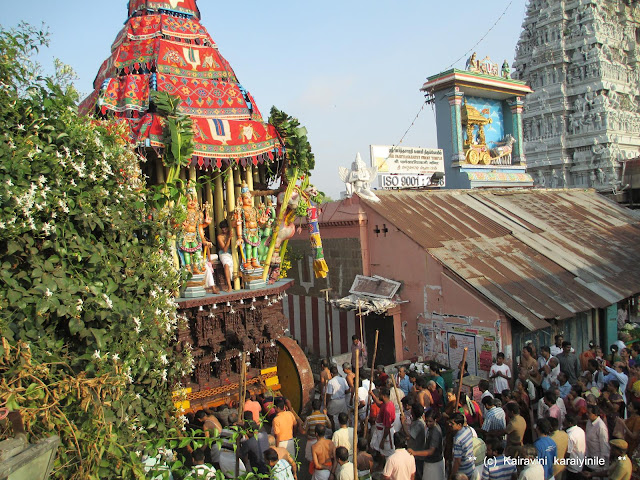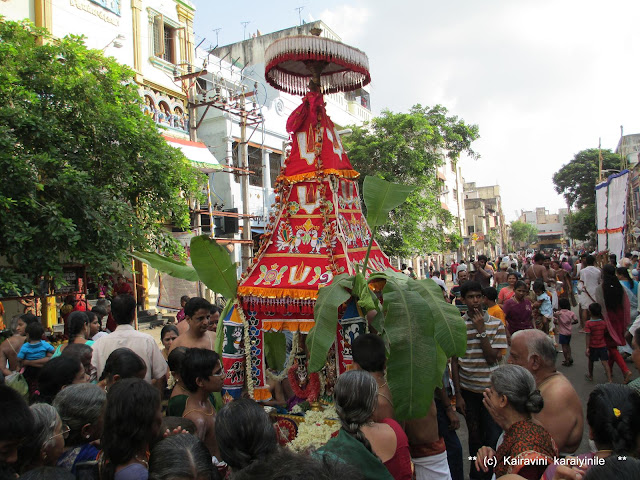ஸ்ரீவைஷ்ணவ ஆலயங்களில் திருத்தேர் புறப்பாடு முக்கியமானது.
பல நூறு - சில ஆயிரம் பக்தர்கள் ஆனந்தத்துடன் கலந்து கொள்ளும்
ஒரு அற்புத நிகழ்ச்சி.
ரதங்கள் (திருத்தேர்) திருக்கோவிலுக்கு அழகு
சேர்ப்பன - அவை நிற்குமிடம் ஒரு முக்கிய பகுதி - திருவல்லிக்கேணியில் தேரடி தெருவை
ஆங்கிலத்தில் கார் ஸ்ட்ரீட் என்பது மருவு ! .. .. ஊர் அமைப்பில் பிரதானமாகத்
திகழ்வது தேரோடும் வீதிகளே. பண்டைக் காலத்தில் மதுரை நகரின் அமைப்பு தாமரை மலரை ஒத்ததாக
இருந்தது என்று பரிபாடல் கூறுகிறது. மாடங்கள் சூழ் மதுரையில் தேர்வலம்
வருதலையொட்டியே கீழ இரதவீதி, மேலஇரத வீதி, தெற்கு இரதவீதி, வடக்கு இரதவீதி என்று இப்போதும்
வழங்கப்படுகிறது. தேர் என்ற ஊர்தி பண்டைக் காலத்தில் போக்குவரவிற்கும், போர் செய்வதற்கும்,
இறைவன் குடிகொள்ளும் நகரும் கோயிலாகவும் மிக உயர்வாக கருதப்பட்டது.
Ratha is the Indo-Iranian term for a spoked-wheel chariot or
a cart of antiquity. In the Indus Valley Civilization sites of Daimabad and
Harappa in the Indian subcontinent, there is evidence for the use of terracotta
model carts as early as 3500 BC during the Ravi Phase. Our famous Ithihasa puranas – Sree Ramayana and
Mahabaratha have specific references of chariots (raths) in war, elaborately
description of its Ratha sarathi (the charioteer), the flagmast symbol and more
!
Gurukshetra was too big to be imagined – the battlefield of that
final war between the Kauravas and the
Pandavas, leaves an indelible impression, more so of the advice Lord Krishna gave to Arjuna. The supreme and unique Bhagavad Gita shows us
the path to moksha, and tells us that we must perform our duties, and yet be
indifferent to the results. But while the Lord’s advice is recalled by us
often, how often do we think of Arjuna’s chariot and meditate on the
chariot?
இரதம் என்பது இழுத்துச் செல்லப்படும்
ஒருவகை வண்டியாகும். பெரும்பாலும் குதிரைகளைக் கொண்டே இழுத்துச் செல்லப்படுகிறது. அக்கால
இராணுவத்தில் வில்வித்தை, வேட்டை போன்றவற்றிற்கு வாகனமாகவும், போக்குவரத்திற்கும் பண்டைய
காலத்தில் பயன்படுத்தியுள்ளனர். ரத-கஜ-துரக-பதாதி என்று ஸைன்யத்தில் நாலு வகை. இப்படிப்
படையானது நாலு அங்கம் கொண்டதாயிருப்பதால்தான் ‘சதுரங்க ஸைன்யம்’ என்பது.
ரத-கஜ-துரக-பதாதி என்பதில் ரதம் தேர்ப்படை, கஜம் யானைப்படை, துரகம்
குதிரைப்படை, பதாதி காலாட்படை. ரதத்திலிருப்பவன் ரதத்திலிருப்பவனோடு, இப்படியே ஒவ்வொருவிதப்
படையிலுமிருப்பவன் அதையே சேர்ந்த எதிராளியோடுதான் யுத்தம் பண்ண வேண்டுமென்று விதி.
மஹாபாரத யுத்தத்தில் ரதங்கள் முக்கிய பங்கு வகித்தன ... மிகமிக பங்கு ரத
சாரதியின் உடையது ! குருக்ஷேத்திர யுத்தத்தில்
பங்கு கொண்ட சேனைகளை அக்ஷௌஹிணி என்ற அலகீட்டால்
விவரித்தனர். ஒரு அக்ஷௌஹிணி சேனை என்றால்
: 21870 ரதங்கள், 21870 யானைகள், 65610 குதிரைகள், 109350 காலாட்படையினர் - நினைத்தாலே
பிரமிக்க வைக்கிறது.
Pompeii, is preserved ancient Roman city in Campania,
Italy, 14 miles (23 km) southeast of Naples, at the southeastern base of Mount
Vesuvius. Around noon on August 24, 79 CE, a huge eruption from Mount Vesuvius
showered volcanic debris over the city of Pompeii, followed the next day by
clouds of blisteringly hot gases. Buildings were destroyed, the population was
crushed or asphyxiated, and the city was buried beneath a blanket of ash and
pumice. For many centuries Pompeii slept beneath its pall of ash, which
perfectly preserved the remains. When these were finally unearthed, in the
1700s, the world was astonished at the discovery of a sophisticated Greco-Roman
city frozen in time.
A month or so ago, there was news of a well-preserved "Lamborghini" of
ancient chariots having been discovered buried in ruins outside of Pompeii.
The Archaeological Park of Pompeii announced "an extraordinary find"
of a ceremonial chariot, complete with its four wheels. The chariot was discovered
"almost intact" with its iron components, bronze and tin decorations,
wood remains and the imprints of its organic decorations, like ropes and
flowers. The park believes it was likely used in ceremonies, like festivals or
parades about 2,000 years ago. Not only is the chariot a luxurious one, but it
was also found "in an excellent state of preservation" that the
Archaeological Park says "has no parallel in Italy thus far." Currently it is in the archaeological park's
laboratory undergoing cleaning. Experts will work on restoration and
reconstruction, CNN reported.
The chariot was discovered at a villa located north of Pompeii, called Civita Giuliana. It was discovered near stables where in 2018, the remains of three horses were found, including one that was still in its harness. The discovery helps researchers build more information about the last moments in Pompeii, which was buried in volcanic ash when Mt. Vesuvius erupted almost 2,000 years ago. Pompeii archaeologists also recently revealed colorful frescoes they had discovered in the back of a house and restored them to their original splendor.
திருவல்லிக்கேணி ஸ்ரீ பார்த்தசாரதி சுவாமி திருத்தேர் அழகானது. மிகப் பெரியது என்று சொல்லமுடியாது எனினும் அது உருண்டு ஓடி வரும் கொள்ளைகொள்ளும் அழகு பிரமிக்க வைக்கும். இதனது சக்கரங்கள், இரும்பாலானவை. மாட வீதிகள் தார் ரோடுகள் ஆனதால் சுமார் இரண்டு மணி நேரத்தில் புறப்பாடுமுடிந்து விடும். ஏராளமான மக்கள் கூடி தேர் இழுப்பர். தேர் வடம் சில ஊர்களில் தாம்புக் கயிற்றினால் ஆனதாக இருக்கும்; சில இடங்களில் இரும்பு. திருவல்லிக்கேணியில் - இரும்பு.
30.4.2013 அன்று காலை 4.30மணிக்கு, ஸ்ரீபார்த்தசாரதி பெருமாள் வேத கோஷத்துடன் திருத்தேருக்கு எழுந்து அருளினார். காலை 07.00 மணிக்கு பக்தர்கள் வடம் பிடிக்க, புறப்பாடு ஆரம்பித்து 08.20 மணியளவில் தேர் நிலை திரும்பியது. மிக துரித கதியில் தேர் நிலைக்கு திரும்பியது பக்தர்களுக்கு பெரும் ஆனந்தம் தந்தது. சாயந்திரம் வரை ஸ்ரீபார்த்தசாரதி திருத்தேர் மீது இருந்து பக்தர்களுக்கு சேவை சாதித்தார். முன்பு திருத்தேர் முடிந்து, பெருமாள் இளைப்பாற வசந்த பங்களா எழுந்து அருளி, திருமஞ்சனம் கண்டுஅருளி வந்தார். இப்போது வசந்த பங்களா இல்லை; புறப்பாடும் திருமஞ்சனமும் நடை பெறுகிறது.
Reminiscing the glorious past olden days, here are some photos of
Rathothsavam at Thiruvallikkeni on 30th April 2013 being
day 7 of Chithirai Brahmothsavam of Sri Parthasarathi Perumal. .. and some photos of chinna pasanga ther
too. Praying Emperuman for restoration of such happiness filled days.
adiyen Srinivasa dhasan
Mamandur Veeravalli Srinivasan Sampathkumar
29th July 2021.














Very nice.
ReplyDelete